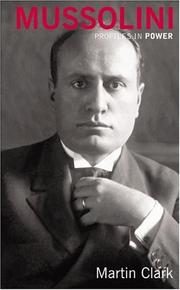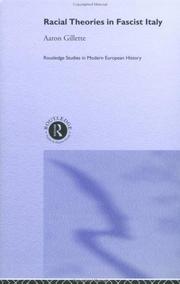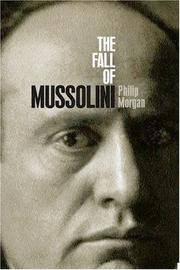| Listing 1 - 10 of 22 | << page >> |
Sort by
|
Book
ISBN: 0140022392 9780140022391 Year: 1975 Publisher: Harmondsworth Penguin books
Abstract | Keywords | Export | Availability | Bookmark
 Loading...
Loading...Choose an application
- Reference Manager
- EndNote
- RefWorks (Direct export to RefWorks)
Mussolini, Benito --- Mussolini, Benito, --- Mousolini, Benito, --- Mo-so-li-ni, --- Duce, --- מוסוליני, ביניטו, --- موسوليني، بنيتو، --- Mussolini, Benito Amilcare Andrea, --- Mussolini, Benito, - 1883-1945

ISBN: 113817520X 131584561X 1317898400 9781317898405 9781315845616 9780582065956 1317898397 Year: 2014 Publisher: Boca Raton, FL : Routledge,
Abstract | Keywords | Export | Availability | Bookmark
 Loading...
Loading...Choose an application
- Reference Manager
- EndNote
- RefWorks (Direct export to RefWorks)
Benito Mussolini was a brilliant Socialist journalist who in 1914 declared war, put himself at the head if the anti-Socialist movement in Italy, manoeuvred himself into power by 1933 and ruled the country until overthrown in 1943. He was a dynamic but insecure personality, who appeared dictatorial but always had to share power with the military and bureaucratic establishment. Mussolini founded an Empire in Africa and tried to 'make Italians' in his own heroic, war like image, but in fact failed to even control his own family! In June 1940, when France fell, he could not resist joining in the Second World War on the German side, although Italy was not equipped for serious fighting. His rule ended in Military disaster and personal humiliation.This new biography focuses both on Mussolini's personality and on the way he exercised power, and regards these two issues as closely linked. It sees him as a man with all the talents needed to attain power but few of those needed to exercise it well. This book primarily focuses on how Mussolini had absolutely the wrong personality for a successful political leader.
Fascists --- Heads of state --- Fascism --- History. --- Mussolini, Benito, --- Mousolini, Benito, --- Mo-so-li-ni, --- Duce, --- מוסוליני, ביניטו, --- موسوليني، بنيتو، --- Italy --- History --- Mussolini, Benito Amilcare Andrea,
Book
ISBN: 1108902421 1108906028 1108905056 1108830595 Year: 2021 Publisher: Cambridge : Cambridge University Press,
Abstract | Keywords | Export | Availability | Bookmark
 Loading...
Loading...Choose an application
- Reference Manager
- EndNote
- RefWorks (Direct export to RefWorks)
Benito Mussolini has persistently been described as an 'actor' - and also as a master of illusions. In her vividly narrated account of the Italian dictator's relationship with the theatre, Patricia Gaborik discards any metaphorical notions of Il Duce as a performer and instead tells the story of his life as literal spectator, critic, impresario, dramatist and censor of the stage. Discussing the ways in which the autarch's personal tastes and convictions shaped, in fascist Italy, theatrical programming, she explores Mussolini's most significant dramatic influences, his association with important figures such as Luigi Pirandello, Gabriele D'Annunzio and George Bernard Shaw, his oversight of stage censorship, and his forays into playwriting. By focusing on its subject's manoeuvres in the theatre, and manipulation of theatrical ideas, this consistently illuminating book transforms our understandings of fascism as a whole. It will have strong appeal to readers in both theatre studies and modern Italian history.
Fascism and theater --- Fascism --- History --- Mussolini, Benito, --- Theater and fascism --- Theater --- Mousolini, Benito, --- Mo-so-li-ni, --- Duce, --- מוסוליני, ביניטו, --- موسوليني، بنيتو، --- Mussolini, Benito Amilcare Andrea,
Book
ISBN: 1787206386 Year: 1928 Publisher: New York : C. Scribner's sons,
Abstract | Keywords | Export | Availability | Bookmark
 Loading...
Loading...Choose an application
- Reference Manager
- EndNote
- RefWorks (Direct export to RefWorks)
My Autobiography is a book by Benito Mussolini. It is a dictated, narrative autobiography recounting the author's youth, his years as an agitator and journalist, his experiences in World War I, the formation and revolutionary struggles of the Fascist Party, the March on Rome, and his early years in power.
Heads of state --- Fascism --- History. --- Mussolini, Benito, --- Mousolini, Benito, --- Mussolini, Benito Amilcare Andrea, --- Mo-so-li-ni, --- Duce, --- מוסוליני, ביניטו, --- موسوليني، بنيتو،
Book
ISBN: 1316371654 131637565X 1316377652 1316378659 1316376656 1316374653 131610673X 1107090431 1107462363 1316365654 Year: 2015 Publisher: Cambridge : Cambridge University Press,
Abstract | Keywords | Export | Availability | Bookmark
 Loading...
Loading...Choose an application
- Reference Manager
- EndNote
- RefWorks (Direct export to RefWorks)
Mussolini in Ethiopia, 1919-1935 looks in detail at the evolution of the Italian Fascist regime's colonial policy within the context of European politics and the rise to power of German National Socialism. It delves into the tortuous nature of relations between the National Fascist Party and the National Socialist German Workers' Party (NSDAP), while demonstrating how, ultimately, a Hitler-led Germany proved the best mechanism for overseas Italian expansion in East Africa. The book assesses the emergence of an ideologically driven Fascist colonial policy from 1931 onwards and how this eventually culminated in a serious clash of interests with the British Empire. Benito Mussolini's successful flouting of the League of Nations' authority heralded a new dark era in world politics and continues to have its resonance in today's world.
Italo-Ethiopian War, 1935-1936 --- Diplomatic relations. --- War --- Causes of war --- Causes. --- Mussolini, Benito, --- Mousolini, Benito, --- Mo-so-li-ni, --- Duce, --- מוסוליני, ביניטו, --- موسوليني، بنيتو، --- Italy --- Ethiopia --- Foreign relations --- Mussolini, Benito Amilcare Andrea,
Book
ISBN: 0582502667 9780582502666 Year: 1976 Publisher: London Longman
Abstract | Keywords | Export | Availability | Bookmark
 Loading...
Loading...Choose an application
- Reference Manager
- EndNote
- RefWorks (Direct export to RefWorks)
History of Europe --- Mussolini, Benito --- anno 1940-1949 --- anno 1930-1939 --- Mussolini, Benito, --- Italy --- Italie --- Politics and government --- History --- Politique et gouvernement --- Histoire --- -Mussolini, Benito, --- -Mussolini, Benito --- Mousolini, Benito, --- Mo-so-li-ni, --- Duce, --- מוסוליני, ביניטו, --- موسوليني، بنيتو، --- Mussolini, Benito Amilcare Andrea, --- Mussolini, Benito, - 1883-1945 --- Italy - Politics and government - 1922-1945
Book
ISBN: 8817843601 Year: 1994 Publisher: Milano Rizzoli
Abstract | Keywords | Export | Availability | Bookmark
 Loading...
Loading...Choose an application
- Reference Manager
- EndNote
- RefWorks (Direct export to RefWorks)
Fascism --- Italian language --- #KVHA:Diachronie; Italiaans --- #KVHA:Sociolinguistiek; Italiaans --- #KVHA:Taalpolitiek; Italie --- Neo-fascism --- Authoritarianism --- Collectivism --- Corporate state --- National socialism --- Synarchism --- Totalitarianism --- Language --- Style --- Mussolini, Benito, --- Mousolini, Benito, --- Mo-so-li-ni, --- Duce, --- מוסוליני, ביניטו, --- موسوليني، بنيتو، --- Language. --- Internal politics --- Lexicology. Semantics --- Pragmatics --- Mussolini, Benito Amilcare Andrea,

ISBN: 1280401699 020316489X 0203279212 9780203164891 9780203279212 9781134527069 1134527063 9786610401697 6610401691 041525292X 9780415252928 9781134527076 1134527071 9781134527021 1134527020 9780415758512 0415758513 Year: 2002 Publisher: London New York Routledge
Abstract | Keywords | Export | Availability | Bookmark
 Loading...
Loading...Choose an application
- Reference Manager
- EndNote
- RefWorks (Direct export to RefWorks)
Racial Theories in Fascist Italy examines the role played by race and racism in the development of Italian identity during the fascist period. The book examines the struggle between Mussolini, the fascist hierarchy, scientists and others in formulating a racial persona that would gain wide acceptance in Italy.This book will be of interest to historians, political scientists concerned with the development of fascism and scholars of race and racism.
Racism --- Antisemitism --- Fascism --- National characteristics, Italian. --- Italian national characteristics --- Bias, Racial --- Race bias --- Race prejudice --- Racial bias --- Prejudices --- Anti-racism --- Critical race theory --- Race relations --- Anti-Jewish attitudes --- Anti-Semitism --- Ethnic relations --- Philosemitism --- History --- Mussolini, Benito, --- Mousolini, Benito, --- Mo-so-li-ni, --- Duce, --- מוסוליני, ביניטו, --- موسوليني، بنيتو، --- Political and social views. --- Italy --- Politics and government --- Mussolini, Benito Amilcare Andrea,
Book
ISBN: 3110527081 3110529750 9783110529753 9783110529760 3110529769 9783110527087 9783110529753 3110526468 9783110526462 Year: 2017 Publisher: Berlin Boston
Abstract | Keywords | Export | Availability | Bookmark
 Loading...
Loading...Choose an application
- Reference Manager
- EndNote
- RefWorks (Direct export to RefWorks)
Hitlers Weg an die Macht ist oft beschrieben worden. Kaum beachtet wurde jedoch bisher, dass er sich dabei in starkem Maße an Mussolini orientierte. Der faschistische Diktator war sein großes Vorbild. Auf ihn ließ er auch nichts kommen, als er selbst die Macht erlangt hatte und der "Duce" von ihm abhängig geworden war. Die beiden Diktatoren verband eine politische Freundschaft, die bis zu ihrem Tode anhielt. Ursachen, Verlauf und Ausdrucksformen dieser ‚Männerfreundschaft‘ sind Gegenstand dieses Buches, das die deutsche Zeitgeschichte ebenso befruchten wird wie die italienische. Much has been written on Hitler’s rise to power. Yet the extent to which Hitler was inspired by Mussolini is often neglected. The Italian dictator was an extremely influential role model for Hitler, and Hitler continued to back Mussolini even after he rose to power and the "Duce" became dependent on his support. Hitler and Mussolini remained political friends until the very end. This book sheds new light on this unique relationship.
World War, 1939-1945 --- Hitler, Adolf, --- Mussolini, Benito, --- Mousolini, Benito, --- Mo-so-li-ni, --- Duce, --- מוסוליני, ביניטו, --- موسوليني، بنيتو، --- Friends and associates. --- Political and social views. --- Influence. --- Germany --- Italy --- Foreign relations --- Mussolini, Benito Amilcare Andrea, --- Role models --- Case studies. --- Hitler, Adolf --- Gitler, Adolʹf, --- Hsi-tʻe-le, --- Hitlar, ʼAdolf, --- Chitler, Adolphos, --- Hitler, Adolph, --- Khitler, Adolf, --- Hitlerus, Adolfus, --- Hiṭlar, Aṭālpu, --- היטלר --- היטלר, אדולף,

ISBN: 1281145203 9786611145200 0191516589 1429487070 9780191516580 019280247X 9780192802477 9781429487078 6611145206 9781281145208 0191578754 1383002517 9780199219346 0199219346 9780191578755 Year: 2007 Publisher: Oxford ; New York : Oxford University Press,
Abstract | Keywords | Export | Availability | Bookmark
 Loading...
Loading...Choose an application
- Reference Manager
- EndNote
- RefWorks (Direct export to RefWorks)
Reconstructing and re-evaluating the causes and consequences of Mussolini's fall from power in July 1943, this volume covers everything from high politics to the everyday experiences of ordinary Italians as war continued to ravage their country.
Fascism --- World War, 1939-1945 --- European War, 1939-1945 --- Second World War, 1939-1945 --- World War 2, 1939-1945 --- World War II, 1939-1945 --- World War Two, 1939-1945 --- WW II (World War, 1939-1945) --- WWII (World War, 1939-1945) --- History, Modern --- History. --- Mussolini, Benito, --- Mousolini, Benito, --- Mo-so-li-ni, --- Duce, --- מוסוליני, ביניטו, --- موسوليني، بنيتو، --- Italy --- History --- Politics and government --- Mussolini, Benito Amilcare Andrea,
| Listing 1 - 10 of 22 | << page >> |
Sort by
|

 Search
Search Feedback
Feedback About UniCat
About UniCat  Help
Help News
News